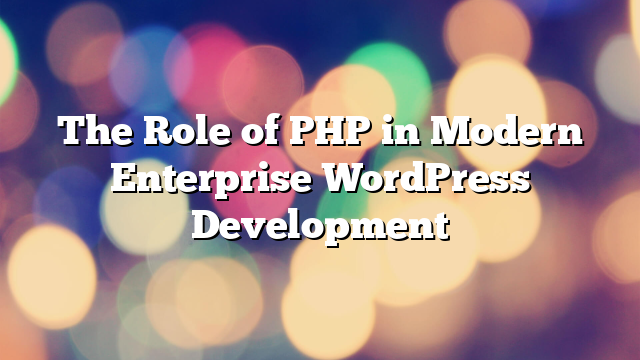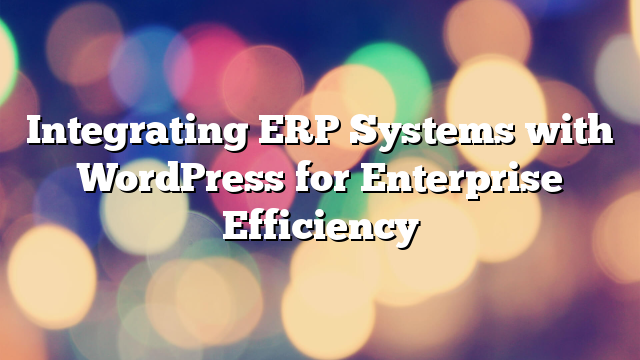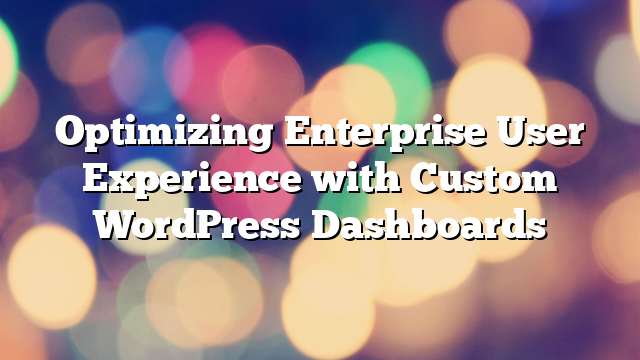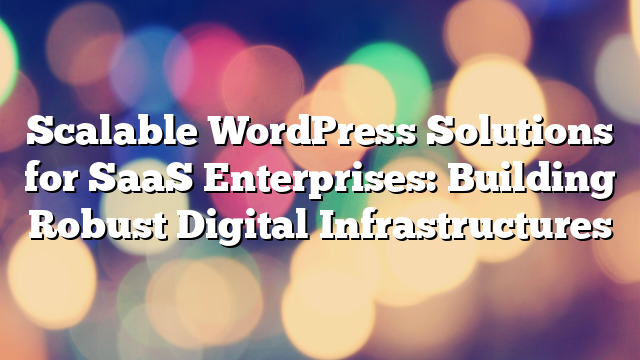The Role of PHP in Modern Enterprise WordPress Development
21.12.2024

WordPress powers over 40% of the web, making it the most popular content management system globally. A significant factor behind its success is PHP, the scripting language that serves as the backbone of WordPress. For enterprise-level projects, understanding and leveraging PHP’s capabilities is crucial to building scalable, secure, and high-performing websites. This article delves into PHP’s role in modern enterprise WordPress development and why it remains vital.
Why PHP is Essential for WordPress
PHP is the core language of WordPress, handling everything from processing user inputs to database interactions and rendering content dynamically. Its flexibility, open-source nature, and widespread adoption make it a reliable choice for enterprises aiming to build and maintain large-scale websites.
Key Benefits of PHP in Enterprise WordPress Development
1. Open-Source and Cost-Effective
PHP is open-source, which means enterprises can build custom solutions without hefty licensing fees. Its vast community ensures continuous improvement and a wealth of free resources for developers.
2. Scalability for Large Websites
Enterprise websites often handle high traffic and complex functionalities. PHP’s ability to scale allows developers to optimize WordPress for performance, whether it’s serving millions of users or supporting intricate workflows.
3. Seamless Database Integration
PHP works effortlessly with databases like MySQL, which is the default database for WordPress. This ensures smooth handling of data storage and retrieval for enterprise websites with extensive content libraries.
4. Wide Developer Community
The PHP ecosystem boasts a large and active community. This ensures enterprises can find skilled developers and access plugins, tools, and frameworks that accelerate development.
5. Security Enhancements
While PHP has faced criticism for security vulnerabilities in the past, modern practices and frameworks have significantly improved its security profile. Developers can now implement robust security measures to protect enterprise websites.
How PHP Powers Advanced WordPress Features
1. Custom Themes and Plugins
PHP enables developers to create tailored themes and plugins, providing enterprises with unique designs and functionalities. From custom booking systems to e-commerce solutions, PHP is at the heart of these innovations.
2. API Integrations
Enterprise websites often rely on integrations with third-party tools like CRM systems, payment gateways, and analytics platforms. PHP allows seamless integration through REST APIs and GraphQL, enhancing operational efficiency.
3. Multisite Networks
WordPress Multisite is a powerful feature for enterprises managing multiple websites under one umbrella. PHP’s scalability and flexibility make it possible to customize and extend Multisite functionality to suit complex requirements.
4. Advanced Content Management
Enterprises require sophisticated content workflows, including version control, approval processes, and role-based access. PHP facilitates these advanced CMS capabilities, ensuring smooth collaboration and content delivery.
Best Practices for Using PHP in Enterprise WordPress Projects
1. Adopt Modern PHP Versions
Using the latest PHP versions ensures better performance, security, and compatibility with modern WordPress features. Enterprises should regularly update their PHP environment to avoid vulnerabilities.
2. Follow Coding Standards
Adhering to WordPress’s PHP coding standards ensures maintainable and consistent code. This is especially important for enterprise projects with multiple developers working on the same codebase.
3. Optimize Performance
Enterprise websites must load quickly and handle high traffic. Developers can use techniques like caching, query optimization, and code refactoring to maximize PHP performance.
4. Secure the Codebase
Enterprises must prioritize security by sanitizing user inputs, validating data, and using nonces to prevent cross-site request forgery (CSRF). Regular security audits help identify and fix vulnerabilities in the PHP codebase.
5. Utilize Object-Oriented Programming (OOP)
Object-oriented programming in PHP enables modular and reusable code, which is crucial for large enterprise projects. OOP also makes it easier to test and maintain the codebase over time.
Challenges of PHP in Enterprise WordPress Development
1. Managing Legacy Code
Enterprises often deal with legacy PHP code, which can hinder scalability and performance. A gradual refactor to modern practices is necessary to maintain efficiency.
2. Ensuring Developer Expertise
Enterprise projects require skilled PHP developers who understand best practices and modern techniques. Investing in training and hiring experienced talent is essential.
3. Balancing Customization and Maintenance
Highly customized PHP code can lead to maintenance challenges. Enterprises should balance customization with maintainability to ensure long-term success.
Conclusion
PHP remains the cornerstone of enterprise WordPress development, offering flexibility, scalability, and security. By leveraging its strengths and adhering to best practices, enterprises can build powerful, future-proof websites that meet their unique needs. Whether it’s creating custom features, integrating APIs, or optimizing performance, PHP’s role in WordPress is irreplaceable.
Looking to harness the full potential of PHP for your WordPress project? Contact AllWebDev today, and let our team of experts deliver a tailored solution for your enterprise.



